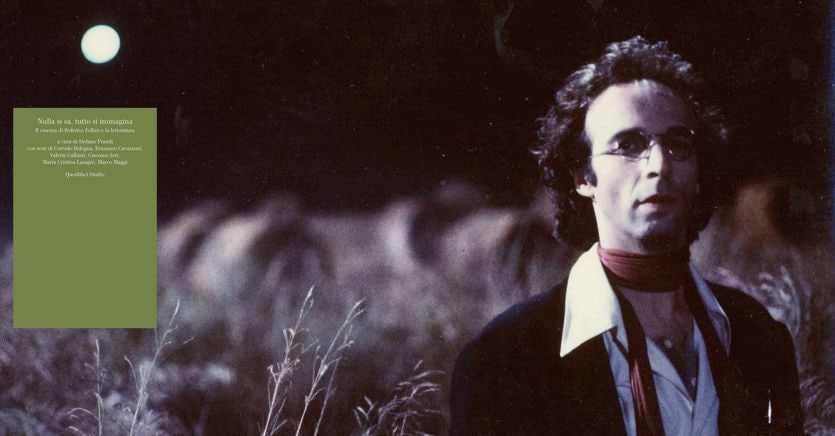A book that if we imagine it as a plane transversely intersects the sphere of Fellini’s world. Biography, completed and unfinished works, director’s dreams are equally subject of discussion. The result is an organic text with a dual nature of specialist study and general reconnaissance, perfect for dissemination. Connoisseurs of both arts will find satisfaction. Comes from Quodlibet Nothing is known, everything is imagined. Federico Fellini’s cinema and literature edited by Stefano Prandi (94 pages, 14.00 euros), with texts by Bologna, Cavazzoni, Galbiati, Jori, Lasagni and Maggi.
Literature and cinema
Although Fellini distrusted the juxtaposition between literature and cinema, believing that «each work of art lives in the dimension in which it was conceived; transferring it, transposing it from the original language to a different one, means canceling it, denying it» also, explains Maggi «even the so-called “original” works (by the director) are characterized by an unscrupulous willingness to draw on literary sources» but this foresees, in the case of Fellini, a “preliminary devaluation” of the sources, a fissure that he opens in them to draw their nuclear essence, some molten substance not yet solidified by the form.
Literary inspiration, thus understood, permeates Fellini’s entire career, from his debut as author of the novel My friend Pasqualino to collaborations with writers such as Pinelli, Flaiano, Guerra, Pasolini, Zapponi, Cavazzoni, Dino Buzzati, who returns several times closing admirable circles, of reciprocal influences between the two artists, as in the essay by Galbiati. Authors who have made the history of twentieth century literature, guides for an initiatory journey that Fellini observes with an oblique gaze, with playful suspicion, to maintain a relationship with them as “schoolmates”, where light-heartedness is necessary to imagine together.
The aim is clear: to keep away from the word with the help of those who are experts in the word. Fellini gave life to a cinema that was, as Deleuze described it, «cinema of the seer» where «the character flees or is chased by a vision». Only Carmelo Bene did a similar job intentionally in the theatre, but Fellini did it without thought: abandoning every written trace and letting the uncanny speak without mediation. The literary references, which are voices, murmurs, chants, which have enchanted Fellini’s imagination are different, but constantly present to the point of establishing an autonomous telepathic relationship with them through a parallel nervous system, a second perceptive network which dreams at the expense of ‘man who only thinks; a double, astral breath, which connects him to Kafka, Poe, Joyce, Ariosto, Dickens, Landolfi, Petronio, Manganelli, Zanzotto, Gozzano to name a few, and then to Dante, like a backbone runs through all the essays in support of the considerations on the Mastorna, that “ghost” of unfinished work which nevertheless gives grace and beauty.
Nothing is known, everything is imagined. Federico Fellini’s cinema and literature, edited by Stefano Prandi, Quodlibet, 94 pages, Euro 14.00
